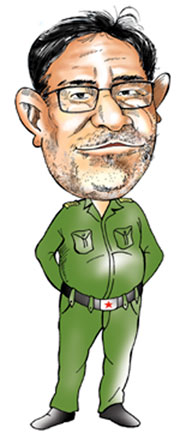 From the time of its conception, the Nepali military's leadership, organisation and deployment have always been a topic of controversy. Their discipline and strength is unmatched but they have always been accountable to the king. When army generals are strong, the kings always forms alliances with them and waits for the right time to use one against the other. It happened during the Rana regime but the Ranas were too smart for the kings and they succeeded in ruling the country for 104 years. When democracy was established in 1951, the military was also reorganised. But the leaders did not understand the importance of the security forces and the king was able to convince the Nepali army to be loyal to him instead. As a result, kings Mahendra and Birendra exploited that weakness and ruled directly in the name of Panchayat. In the 1990 constitution, all power over the army was given to the prime minister and deputy prime minister under the Security Council.
From the time of its conception, the Nepali military's leadership, organisation and deployment have always been a topic of controversy. Their discipline and strength is unmatched but they have always been accountable to the king. When army generals are strong, the kings always forms alliances with them and waits for the right time to use one against the other. It happened during the Rana regime but the Ranas were too smart for the kings and they succeeded in ruling the country for 104 years. When democracy was established in 1951, the military was also reorganised. But the leaders did not understand the importance of the security forces and the king was able to convince the Nepali army to be loyal to him instead. As a result, kings Mahendra and Birendra exploited that weakness and ruled directly in the name of Panchayat. In the 1990 constitution, all power over the army was given to the prime minister and deputy prime minister under the Security Council.
The army's deployment was to be done with the king's recommendation. The commander in chief was to be chosen on the recommendation of the prime minister. The prime minister has always held the defence portfolio and the country has suffered a lot due to this provision because the prime ministers have never had enough time to understand the military's workings. As a result, the army grew stronger and whatever decisions the military leadership made, political leaders started agreeing. The spirit of the military law hasn't changed. It still says that the army should answer to the king. We need to critically look at the mistakes and weaknesses of the military. First, why couldn't the military that is now demanding that all political parties stand together in parliament demand the same thing from the king's leadership?
The army does not receive a penny from the king's funds, whatever it receives is from the taxpayers' pocket. So the army should be accountable to people. The new topic of discussion is the army's role in coming days. People have already removed the king's authority over the army. The Nepali army has a very good reputation in international peacekeeping. But if it starts violating human rights the reputation will erode. To avoid that, the army must remain under the people. The people's representatives may be ugly, illiterate, slipper-wearing and wear long, dirty hair but to change the culture the army has to accept them because they were chosen by the people.


